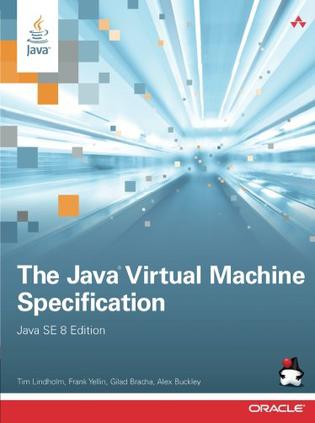 The Java Virtual Machine Specification, Java SE 8 Editiontxt,chm,pdf,epub,mobi下载
The Java Virtual Machine Specification, Java SE 8 Editiontxt,chm,pdf,epub,mobi下载作者: Tim Lindholm / Frank Yellin / Gilad Bracha / Alex Buckley 出版社: Addison-Wesley Professional 出版年: 2014-5-17 页数: 600 定价: USD 59.99 装帧: Paperback ISBN: 9780133905908 内容简介 · · · · · ·Written by the inventors of the technology, The Java® Virtual Machine Specification, Java SE 8 Edition is the definitive technical reference for the Java Virtual Machine. The book provides complete, accurate, and detailed coverage of the Java Virtual Machine. It fully describes the new features added in Java SE 8, including the invocation of default methods and the class file ... 作者简介 · · · · · ·Tim Lindholm is a former Distinguished Engineer at Sun Microsystems. He was a contributor to the Java programming language and the senior architect of the Java Virtual Machine, later working on Java for mobile devices. Prior to Sun, he worked on virtual machines and runtime systems for Prolog at Argonne National Laboratory and Quintus. He holds a B.A. in Mathematics from Carlet... 目录 · · · · · ·1 Introduction 11.1 Organization of the Specification 2 1.2 Example Programs 6 1.3 Notation 6 1.4 Relationship to Predefined Classes and Interfaces 7 1.5 Feedback 7 · · · · · · () 1 Introduction 1 1.1 Organization of the Specification 2 1.2 Example Programs 6 1.3 Notation 6 1.4 Relationship to Predefined Classes and Interfaces 7 1.5 Feedback 7 1.6 References 7 2 Grammars 9 2.1 Context-Free Grammars 9 2.2 The Lexical Grammar 9 2.3 The Syntactic Grammar 10 2.4 Grammar Notation 10 3 Lexical Structure 15 3.1 Unicode 15 3.2 Lexical Translations 16 3.3 Unicode Escapes 17 3.4 Line Terminators 19 3.5 Input Elements and Tokens 19 3.6 White Space 20 3.7 Comments 21 3.8 Identifiers 22 3.9 Keywords 24 3.10 Literals 24 3.10.1 Integer Literals 25 3.10.2 Floating-Point Literals 31 3.10.3 Boolean Literals 34 3.10.4 Character Literals 34 3.10.5 String Literals 35 3.10.6 Escape Sequences for Character and String Literals 37 3.10.7 The Null Literal 38 3.11 Separators 38 3.12 Operators 39The Java® Language Specification vi 4 Types, Values, and Variables 41 4.1 The Kinds of Types and Values 41 4.2 Primitive Types and Values 42 4.2.1 Integral Types and Values 43 4.2.2 Integer Operations 43 4.2.3 Floating-Point Types, Formats, and Values 45 4.2.4 Floating-Point Operations 48 4.2.5 The boolean Type and boolean Values 51 4.3 Reference Types and Values 52 4.3.1 Objects 53 4.3.2 The Class Object 56 4.3.3 The Class String 56 4.3.4 When Reference Types Are the Same 57 4.4 Type Variables 57 4.5 Parameterized Types 59 4.5.1 Type Arguments of Parameterized Types 60 4.5.2 Members and Constructors of Parameterized Types 63 4.6 Type Erasure 64 4.7 Reifiable Types 65 4.8 Raw Types 66 4.9 Intersection Types 70 4.10 Subtyping 71 4.10.1 Subtyping among Primitive Types 71 4.10.2 Subtyping among Class and Interface Types 72 4.10.3 Subtyping among Array Types 73 4.10.4 Least Upper Bound 73 4.11 Where Types Are Used 76 4.12 Variables 80 4.12.1 Variables of Primitive Type 81 4.12.2 Variables of Reference Type 81 4.12.3 Kinds of Variables 83 4.12.4 final Variables 85 4.12.5 Initial Values of Variables 87 4.12.6 Types, Classes, and Interfaces 88 5 Conversions and Contexts 91 5.1 Kinds of Conversion 94 5.1.1 Identity Conversion 94 5.1.2 Widening Primitive Conversion 94 5.1.3 Narrowing Primitive Conversion 96 5.1.4 Widening and Narrowing Primitive Conversion 99 5.1.5 Widening Reference Conversion 99 5.1.6 Narrowing Reference Conversion 99 5.1.7 Boxing Conversion 100 5.1.8 Unboxing Conversion 102 5.1.9 Unchecked Conversion 103 5.1.10 Capture Conversion 103The Java® Language Specification vii 5.1.11 String Conversion 105 5.1.12 Forbidden Conversions 106 5.1.13 Value Set Conversion 106 5.2 Assignment Contexts 107 5.3 Invocation Contexts 112 5.4 String Contexts 114 5.5 Casting Contexts 114 5.5.1 Reference Type Casting 118 5.5.2 Checked Casts and Unchecked Casts 122 5.5.3 Checked Casts at Run Time 123 5.6 Numeric Contexts 125 5.6.1 Unary Numeric Promotion 125 5.6.2 Binary Numeric Promotion 126 6 Names 129 6.1 Declarations 130 6.2 Names and Identifiers 137 6.3 Scope of a Declaration 139 6.4 Shadowing and Obscuring 142 6.4.1 Shadowing 144 6.4.2 Obscuring 147 6.5 Determining the Meaning of a Name 148 6.5.1 Syntactic Classification of a Name According to Context 149 6.5.2 Reclassification of Contextually Ambiguous Names 152 6.5.3 Meaning of Package Names 154 6.5.3.1 Simple Package Names 155 6.5.3.2 Qualified Package Names 155 6.5.4 Meaning of PackageOrTypeNames 155 6.5.4.1 Simple PackageOrTypeNames 155 6.5.4.2 Qualified PackageOrTypeNames 155 6.5.5 Meaning of Type Names 155 6.5.5.1 Simple Type Names 156 6.5.5.2 Qualified Type Names 156 6.5.6 Meaning of Expression Names 156 6.5.6.1 Simple Expression Names 156 6.5.6.2 Qualified Expression Names 157 6.5.7 Meaning of Method Names 160 6.5.7.1 Simple Method Names 160 6.6 Access Control 161 6.6.1 Determining Accessibility 162 6.6.2 Details on protected Access 166 6.6.2.1 Access to a protected Member 167 6.6.2.2 Qualified Access to a protected Constructor 167 6.7 Fully Qualified Names and Canonical Names 169 7 Packages 173 7.1 Package Members 173The Java® Language Specification viii 7.2 Host Support for Packages 175 7.3 Compilation Units 177 7.4 Package Declarations 178 7.4.1 Named Packages 178 7.4.2 Unnamed Packages 179 7.4.3 Observability of a Package 179 7.5 Import Declarations 180 7.5.1 Single-Type-Import Declarations 180 7.5.2 Type-Import-on-Demand Declarations 183 7.5.3 Single-Static-Import Declarations 184 7.5.4 Static-Import-on-Demand Declarations 184 7.6 Top Level Type Declarations 185 8 Classes 189 8.1 Class Declarations 191 8.1.1 Class Modifiers 191 8.1.1.1 abstract Classes 192 8.1.1.2 final Classes 194 8.1.1.3 strictfp Classes 194 8.1.2 Generic Classes and Type Parameters 194 8.1.3 Inner Classes and Enclosing Instances 197 8.1.4 Superclasses and Subclasses 200 8.1.5 Superinterfaces 202 8.1.6 Class Body and Member Declarations 205 8.2 Class Members 206 8.3 Field Declarations 211 8.3.1 Field Modifiers 215 8.3.1.1 static Fields 216 8.3.1.2 final Fields 219 8.3.1.3 transient Fields 219 8.3.1.4 volatile Fields 220 8.3.2 Field Initialization 221 8.3.3 Forward References During Field Initialization 222 8.4 Method Declarations 225 8.4.1 Formal Parameters 226 8.4.2 Method Signature 230 8.4.3 Method Modifiers 231 8.4.3.1 abstract Methods 232 8.4.3.2 static Methods 233 8.4.3.3 final Methods 234 8.4.3.4 native Methods 235 8.4.3.5 strictfp Methods 235 8.4.3.6 synchronized Methods 235 8.4.4 Generic Methods 237 8.4.5 Method Result 237 8.4.6 Method Throws 238 8.4.7 Method Body 240The Java® Language Specification ix 8.4.8 Inheritance, Overriding, and Hiding 240 8.4.8.1 Overriding (by Instance Methods) 241 8.4.8.2 Hiding (by Class Methods) 245 8.4.8.3 Requirements in Overriding and Hiding 246 8.4.8.4 Inheriting Methods with Override-Equivalent Signatures 250 8.4.9 Overloading 250 8.5 Member Type Declarations 254 8.5.1 Static Member Type Declarations 254 8.6 Instance Initializers 255 8.7 Static Initializers 255 8.8 Constructor Declarations 256 8.8.1 Formal Parameters 257 8.8.2 Constructor Signature 258 8.8.3 Constructor Modifiers 258 8.8.4 Generic Constructors 259 8.8.5 Constructor Throws 259 8.8.6 The Type of a Constructor 259 8.8.7 Constructor Body 259 8.8.7.1 Explicit Constructor Invocations 260 8.8.8 Constructor Overloading 264 8.8.9 Default Constructor 265 8.8.10 Preventing Instantiation of a Class 266 8.9 Enum Types 266 8.9.1 Enum Constants 267 8.9.2 Enum Body Declarations 268 8.9.3 Enum Members 271 9 Interfaces 277 9.1 Interface Declarations 278 9.1.1 Interface Modifiers 278 9.1.1.1 abstract Interfaces 279 9.1.1.2 strictfp Interfaces 279 9.1.2 Generic Interfaces and Type Parameters 279 9.1.3 Superinterfaces and Subinterfaces 280 9.1.4 Interface Body and Member Declarations 282 9.2 Interface Members 282 9.3 Field (Constant) Declarations 283 9.3.1 Initialization of Fields in Interfaces 285 9.4 Method Declarations 286 9.4.1 Inheritance and Overriding 287 9.4.1.1 Overriding (by Instance Methods) 288 9.4.1.2 Requirements in Overriding 289 9.4.1.3 Inheriting Methods with Override-Equivalent Signatures 289 9.4.2 Overloading 290 9.4.3 Interface Method Body 291The Java® Language Specification x 9.5 Member Type Declarations 291 9.6 Annotation Types 292 9.6.1 Annotation Type Elements 293 9.6.2 Defaults for Annotation Type Elements 297 9.6.3 Repeatable Annotation Types 298 9.6.4 Predefined Annotation Types 302 9.6.4.1 @Target 302 9.6.4.2 @Retention 303 9.6.4.3 @Inherited 304 9.6.4.4 @Override 304 9.6.4.5 @SuppressWarnings 305 9.6.4.6 @Deprecated 306 9.6.4.7 @SafeVarargs 307 9.6.4.8 @Repeatable 308 9.6.4.9 @FunctionalInterface 308 9.7 Annotations 308 9.7.1 Normal Annotations 309 9.7.2 Marker Annotations 311 9.7.3 Single-Element Annotations 312 9.7.4 Where Annotations May Appear 313 9.7.5 Multiple Annotations Of The Same Type 318 9.8 Functional Interfaces 319 9.9 Function Types 323 10 Arrays 329 10.1 Array Types 330 10.2 Array Variables 330 10.3 Array Creation 332 10.4 Array Access 332 10.5 Array Store Exception 333 10.6 Array Initializers 335 10.7 Array Members 336 10.8 Class Objects for Arrays 338 10.9 An Array of Characters is Not a String 339 11 Exceptions 341 11.1 The Kinds and Causes of Exceptions 342 11.1.1 The Kinds of Exceptions 342 11.1.2 The Causes of Exceptions 343 11.1.3 Asynchronous Exceptions 344 11.2 Compile-Time Checking of Exceptions 345 11.2.1 Exception Analysis of Expressions 346 11.2.2 Exception Analysis of Statements 347 11.2.3 Exception Checking 348 11.3 Run-Time Handling of an Exception 350The Java® Language Specification xi 12 Execution 355 12.1 Java Virtual Machine Startup 355 12.1.1 Load the Class Test 356 12.1.2 Link Test: Verify, Prepare, (Optionally) Resolve 356 12.1.3 Initialize Test: Execute Initializers 357 12.1.4 Invoke Test.main 358 12.2 Loading of Classes and Interfaces 358 12.2.1 The Loading Process 359 12.3 Linking of Classes and Interfaces 360 12.3.1 Verification of the Binary Representation 360 12.3.2 Preparation of a Class or Interface Type 361 12.3.3 Resolution of Symbolic References 361 12.4 Initialization of Classes and Interfaces 362 12.4.1 When Initialization Occurs 363 12.4.2 Detailed Initialization Procedure 365 12.5 Creation of New Class Instances 367 12.6 Finalization of Class Instances 371 12.6.1 Implementing Finalization 372 12.6.2 Interaction with the Memory Model 374 12.7 Unloading of Classes and Interfaces 375 12.8 Program Exit 376 13 Binary Compatibility 377 13.1 The Form of a Binary 378 13.2 What Binary Compatibility Is and Is Not 384 13.3 Evolution of Packages 385 13.4 Evolution of Classes 385 13.4.1 abstract Classes 385 13.4.2 final Classes 385 13.4.3 public Classes 386 13.4.4 Superclasses and Superinterfaces 386 13.4.5 Class Type Parameters 387 13.4.6 Class Body and Member Declarations 388 13.4.7 Access to Members and Constructors 389 13.4.8 Field Declarations 390 13.4.9 final Fields and static Constant Variables 393 13.4.10 static Fields 395 13.4.11 transient Fields 395 13.4.12 Method and Constructor Declarations 396 13.4.13 Method and Constructor Type Parameters 396 13.4.14 Method and Constructor Formal Parameters 397 13.4.15 Method Result Type 398 13.4.16 abstract Methods 398 13.4.17 final Methods 399 13.4.18 native Methods 399 13.4.19 static Methods 400 13.4.20 synchronized Methods 400he Java® Language Specification xii 13.4.21 Method and Constructor Throws 400 13.4.22 Method and Constructor Body 400 13.4.23 Method and Constructor Overloading 401 13.4.24 Method Overriding 402 13.4.25 Static Initializers 402 13.4.26 Evolution of Enums 402 13.5 Evolution of Interfaces 402 13.5.1 public Interfaces 402 13.5.2 Superinterfaces 403 13.5.3 Interface Members 403 13.5.4 Interface Type Parameters 403 13.5.5 Field Declarations 404 13.5.6 Interface Method Declarations 404 13.5.7 Evolution of Annotation Types 405 14 Blocks and Statements 407 14.1 Normal and Abrupt Completion of Statements 407 14.2 Blocks 409 14.3 Local Class Declarations 409 14.4 Local Variable Declaration Statements 410 14.4.1 Local Variable Declarators and Types 411 14.4.2 Execution of Local Variable Declarations 412 14.5 Statements 412 14.6 The Empty Statement 414 14.7 Labeled Statements 415 14.8 Expression Statements 416 14.9 The if Statement 417 14.9.1 The if-then Statement 417 14.9.2 The if-then-else Statement 418 14.10 The assert Statement 418 14.11 The switch Statement 421 14.12 The while Statement 425 14.12.1 Abrupt Completion of while Statement 426 14.13 The do Statement 426 14.13.1 Abrupt Completion of do Statement 427 14.14 The for Statement 428 14.14.1 The basic for Statement 428 14.14.1.1 Initialization of for Statement 429 14.14.1.2 Iteration of for Statement 429 14.14.1.3 Abrupt Completion of for Statement 430 14.14.2 The enhanced for statement 431 14.15 The break Statement 434 14.16 The continue Statement 436 14.17 The return Statement 438 14.18 The throw Statement 439 14.19 The synchronized Statement 441 14.20 The try statement 442The Java® Language Specification xiii 14.20.1 Execution of try-catch 446 14.20.2 Execution of try-finally and try-catch-finally 447 14.20.3 try-with-resources 449 14.20.3.1 Basic try-with-resources 450 14.20.3.2 Extended try-with-resources 453 14.21 Unreachable Statements 454 15 Expressions 461 15.1 Evaluation, Denotation, and Result 461 15.2 Forms of Expressions 462 15.3 Type of an Expression 463 15.4 FP-strict Expressions 464 15.5 Expressions and Run-Time Checks 464 15.6 Normal and Abrupt Completion of Evaluation 466 15.7 Evaluation Order 468 15.7.1 Evaluate Left-Hand Operand First 468 15.7.2 Evaluate Operands before Operation 470 15.7.3 Evaluation Respects Parentheses and Precedence 471 15.7.4 Argument Lists are Evaluated Left-to-Right 472 15.7.5 Evaluation Order for Other Expressions 473 15.8 Primary Expressions 473 15.8.1 Lexical Literals 474 15.8.2 Class Literals 475 15.8.3 this 476 15.8.4 Qualified this 477 15.8.5 Parenthesized Expressions 477 15.9 Class Instance Creation Expressions 478 15.9.1 Determining the Class being Instantiated 479 15.9.2 Determining Enclosing Instances 481 15.9.3 Choosing the Constructor and its Arguments 483 15.9.4 Run-Time Evaluation of Class Instance Creation Expressions 485 15.9.5 Anonymous Class Declarations 487 15.9.5.1 Anonymous Constructors 487 15.10 Array Creation and Access Expressions 488 15.10.1 Array Creation Expressions 488 15.10.2 Run-Time Evaluation of Array Creation Expressions 489 15.10.3 Array Access Expressions 493 15.10.4 Run-Time Evaluation of Array Access Expressions 493 15.11 Field Access Expressions 496 15.11.1 Field Access Using a Primary 496 15.11.2 Accessing Superclass Members using super 499 15.12 Method Invocation Expressions 500 15.12.1 Compile-Time Step 1: Determine Class or Interface to Search 502 15.12.2 Compile-Time Step 2: Determine Method Signature 504 15.12.2.1 Identify Potentially Applicable Methods 510he Java® Language Specification xiv 15.12.2.2 Phase 1: Identify Matching Arity Methods Applicable by Strict Invocation 513 15.12.2.3 Phase 2: Identify Matching Arity Methods Applicable by Loose Invocation 514 15.12.2.4 Phase 3: Identify Methods Applicable by Variable Arity Invocation 514 15.12.2.5 Choosing the Most Specific Method 515 15.12.2.6 Method Invocation Type 518 15.12.3 Compile-Time Step 3: Is the Chosen Method Appropriate? 518 15.12.4 Run-Time Evaluation of Method Invocation 521 15.12.4.1 Compute Target Reference (If Necessary) 522 15.12.4.2 Evaluate Arguments 523 15.12.4.3 Check Accessibility of Type and Method 524 15.12.4.4 Locate Method to Invoke 525 15.12.4.5 Create Frame, Synchronize, Transfer Control 529 15.13 Method Reference Expressions 531 15.13.1 Compile-Time Declaration of a Method Reference 534 15.13.2 Type of a Method Reference 539 15.13.3 Run-time Evaluation of Method References 541 15.14 Postfix Expressions 544 15.14.1 Expression Names 545 15.14.2 Postfix Increment Operator ++ 545 15.14.3 Postfix Decrement Operator -- 545 15.15 Unary Operators 546 15.15.1 Prefix Increment Operator ++ 548 15.15.2 Prefix Decrement Operator -- 548 15.15.3 Unary Plus Operator + 549 15.15.4 Unary Minus Operator - 549 15.15.5 Bitwise Complement Operator ~ 550 15.15.6 Logical Complement Operator ! 550 15.16 Cast Expressions 550 15.17 Multiplicative Operators 552 15.17.1 Multiplication Operator * 553 15.17.2 Division Operator / 554 15.17.3 Remainder Operator % 555 15.18 Additive Operators 558 15.18.1 String Concatenation Operator + 558 15.18.2 Additive Operators (+ and -) for Numeric Types 561 15.19 Shift Operators 563 15.20 Relational Operators 564 15.20.1 Numerical Comparison Operators <, <=, >, and >= 564 15.20.2 Type Comparison Operator instanceof 566 15.21 Equality Operators 567 15.21.1 Numerical Equality Operators == and != 567 15.21.2 Boolean Equality Operators == and != 568 15.21.3 Reference Equality Operators == and != 569 15.22 Bitwise and Logical Operators 569 15.22.1 Integer Bitwise Operators &, ^, and | 570The Java® Language Specification xv 15.22.2 Boolean Logical Operators &, ^, and | 571 15.23 Conditional-And Operator && 571 15.24 Conditional-Or Operator || 572 15.25 Conditional Operator ? : 573 15.25.1 Boolean Conditional Expressions 580 15.25.2 Numeric Conditional Expressions 580 15.25.3 Reference Conditional Expressions 581 15.26 Assignment Operators 582 15.26.1 Simple Assignment Operator = 583 15.26.2 Compound Assignment Operators 589 15.27 Lambda Expressions 595 15.27.1 Lambda Parameters 597 15.27.2 Lambda Body 600 15.27.3 Type of a Lambda Expression 603 15.27.4 Run-time Evaluation of Lambda Expressions 605 15.28 Constant Expressions 606 16 Definite Assignment 609 16.1 Definite Assignment and Expressions 615 16.1.1 Boolean Constant Expressions 615 16.1.2 Conditional-And Operator && 615 16.1.3 Conditional-Or Operator || 616 16.1.4 Logical Complement Operator ! 616 16.1.5 Conditional Operator ? : 616 16.1.6 Conditional Operator ? : 617 16.1.7 Other Expressions of Type boolean 617 16.1.8 Assignment Expressions 617 16.1.9 Operators ++ and -- 618 16.1.10 Other Expressions 618 16.2 Definite Assignment and Statements 619 16.2.1 Empty Statements 619 16.2.2 Blocks 619 16.2.3 Local Class Declaration Statements 621 16.2.4 Local Variable Declaration Statements 621 16.2.5 Labeled Statements 621 16.2.6 Expression Statements 622 16.2.7 if Statements 622 16.2.8 assert Statements 622 16.2.9 switch Statements 623 16.2.10 while Statements 623 16.2.11 do Statements 624 16.2.12 for Statements 624 16.2.12.1 Initialization Part of for Statement 625 16.2.12.2 Incrementation Part of for Statement 625 16.2.13 break, continue, return, and throw Statements 626 16.2.14 synchronized Statements 626 16.2.15 try Statements 626he Java® Language Specification xvi 16.3 Definite Assignment and Parameters 628 16.4 Definite Assignment and Array Initializers 628 16.5 Definite Assignment and Enum Constants 628 16.6 Definite Assignment and Anonymous Classes 629 16.7 Definite Assignment and Member Types 629 16.8 Definite Assignment and Static Initializers 630 16.9 Definite Assignment, Constructors, and Instance Initializers 630 17 Threads and Locks 633 17.1 Synchronization 634 17.2 Wait Sets and Notification 634 17.2.1 Wait 635 17.2.2 Notification 636 17.2.3 Interruptions 637 17.2.4 Interactions of Waits, Notification, and Interruption 637 17.3 Sleep and Yield 638 17.4 Memory Model 639 17.4.1 Shared Variables 642 17.4.2 Actions 642 17.4.3 Programs and Program Order 643 17.4.4 Synchronization Order 644 17.4.5 Happens-before Order 645 17.4.6 Executions 648 17.4.7 Well-Formed Executions 649 17.4.8 Executions and Causality Requirements 649 17.4.9 Observable Behavior and Nonterminating Executions 652 17.5 final Field Semantics 654 17.5.1 Semantics of final Fields 656 17.5.2 Reading final Fields During Construction 656 17.5.3 Subsequent Modification of final Fields 657 17.5.4 Write-protected Fields 658 17.6 Word Tearing 659 17.7 Non-atomic Treatment of double and long 660 18 Type Inference 661 18.1 Concepts and Notation 662 18.1.1 Inference Variables 662 18.1.2 Constraint Formulas 663 18.1.3 Bounds 663 18.2 Reduction 665 18.2.1 Expression Compatibility Constraints 665 18.2.2 Type Compatibility Constraints 670 18.2.3 Subtyping Constraints 670 18.2.4 Type Equality Constraints 672 18.2.5 Checked Exception Constraints 673 18.3 Incorporation 675 18.3.1 Complementary Pairs of Bounds 676he Java® Language Specification xvii 18.3.2 Bounds Involving Capture Conversion 676 18.4 Resolution 677 18.5 Uses of Inference 679 18.5.1 Invocation Applicability Inference 680 18.5.2 Invocation Type Inference 681 18.5.3 Functional Interface Parameterization Inference 687 18.5.4 More Specific Method Inference 688 19 Syntax 691 Index 717 A Limited License Grant 757 · · · · · · () |
 首页
首页



感觉学到了非常多的知识
很不错的书
给别人买的
细细品吧~